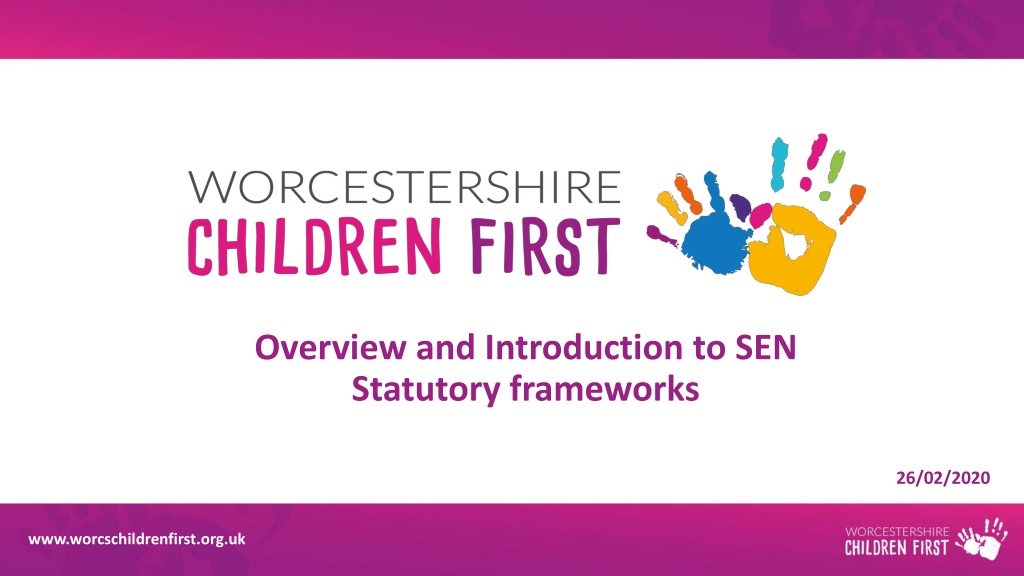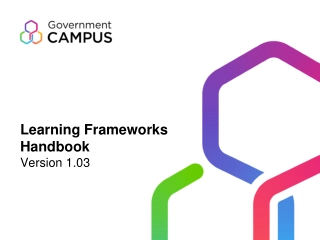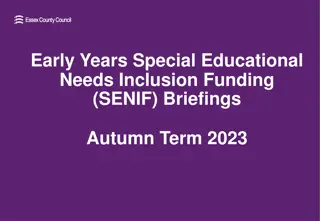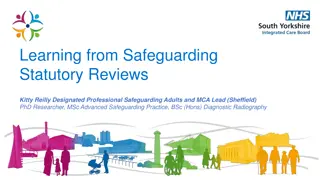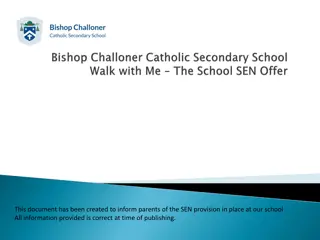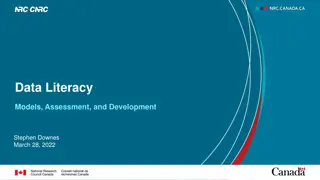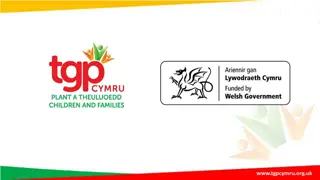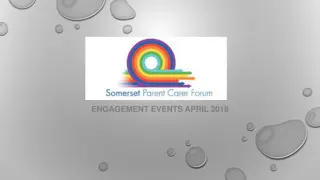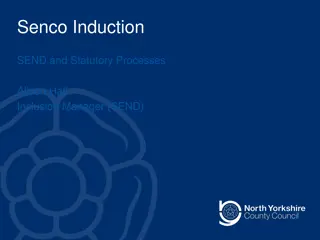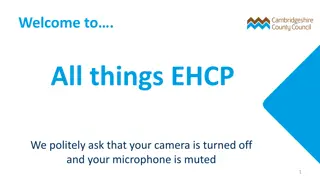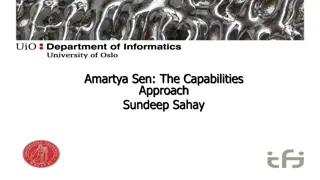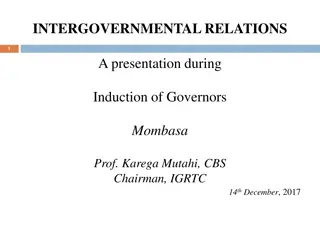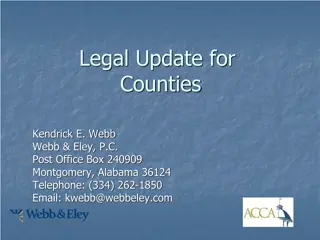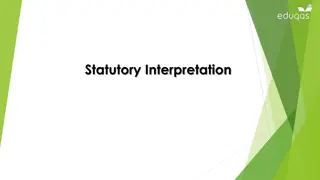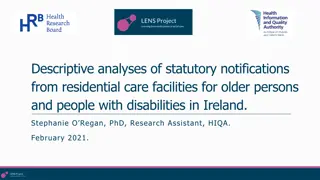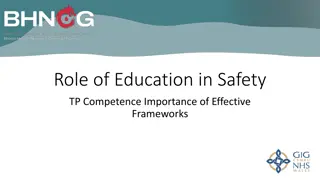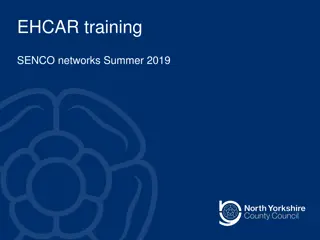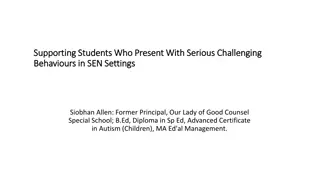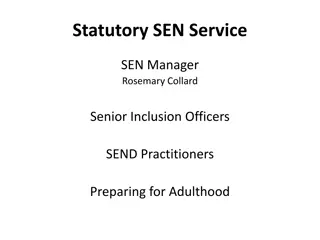Understanding Special Educational Needs (SEN) Statutory Frameworks
This document provides professionals with a clear understanding of the legislation and processes for SEN Support and EHC Needs Assessment. It covers topics such as special educational needs definition, SEN support, EHC assessments, time frames, and an introduction to EHC plans. The aim is to enhance professionals' knowledge of SEND processes and responsibilities within the system. Signposting to additional resources is also included for further information.
Download Presentation

Please find below an Image/Link to download the presentation.
The content on the website is provided AS IS for your information and personal use only. It may not be sold, licensed, or shared on other websites without obtaining consent from the author. Download presentation by click this link. If you encounter any issues during the download, it is possible that the publisher has removed the file from their server.
E N D
Presentation Transcript
Overview and Introduction to SEN Statutory frameworks 26/02/2020 www.worcschildrenfirst.org.uk
Introduction The aim of this document is to provide professionals with a clear understanding of the legislation and process for SEND Support and EHC Needs Assessment. Professionals will then understand their responsibility for SEND within these processes. The target audience for this document is NHS and Council staff within SEND. www.worcschildrenfirst.org.uk
Aims of the session To have an improved understanding of SEND assessment and planning. To improve understanding of reasoning behind SEND processes. Signposting to other useful links and sources of information. www.worcschildrenfirst.org.uk
Topics 1. What is a Special Educational Need. 2. SEN Support. 3. Education, Health and Care Assessments. 4. Time frames. 5. Brief introduction to the EHC Plan. www.worcschildrenfirst.org.uk
What is a Special Educational Need? Definition of SEN section 20 (CFA 2014) A child or young person has special educational needs if he or she has: A learning difficulty or disability which calls for special educational provision to be made for him or her. www.worcschildrenfirst.org.uk
Learning difficulty Has a significantly greater difficulty in learning than the majority of others of the same age. For children under compulsory school age the test is the same but it looks forward and asks whether the child is likely to fall within the definition when reaching compulsory school age. www.worcschildrenfirst.org.uk
Disability Has a disability which prevents or hinders him or her from making use of facilities of a kind generally provided for others of the same age in mainstream schools or mainstream post-16 institutions. www.worcschildrenfirst.org.uk
Special Educational Provision Learning difficulty Disability Special Educational Provision www.worcschildrenfirst.org.uk
Special Educational Provision (Continued) For a child aged two or more or a young person, means educational or training provision that is additional to, or differentfrom, that made generally for others of the same age. Is the particular provision required to address it directly related to his learning difficulty . Banding and Local Offer. www.worcschildrenfirst.org.uk
Health and social care (s.21 (5)) Must be treated as educational provision if: Trains or educates. Therapies including Speech and Language, Occupational Therapy and Physiotherapy. www.worcschildrenfirst.org.uk
Health, Social, Educational or otherwise All that anyone can do when judging whether a provision is educational or non educational is recognise that there is an obvious spectrum from the clearly educational (in the ordinary schools sense of the word) at one end to the clearly medical at the other, take all the relevant facts into account, apply common sense and do one s best. www.worcschildrenfirst.org.uk
What is not SEN English as an additional language. Transport. School refusal - refusal to attend school is not normally an SEN because it is not a need calling for special educational provision because the underlying problem should be addressed by CAMHS. Behaviour (BSD) - Persistent disruptive or withdrawn behaviours do not necessarily mean that a child or young person has SEN. Where there are concerns, there should be an assessment to determine whether there are any causal factors such as undiagnosed learning difficulties, difficulties with communication or mental health issues. If it is thought housing, family or other domestic circumstances may be contributing to the presenting behaviour a multi-agency approach, supported by the use of approaches such as the Early Help Assessment, may be appropriate. www.worcschildrenfirst.org.uk
Graduated Approach A model of action and intervention in early education settings, schools and colleges to help children and young people who have special educational needs. The approach recognises that there is a continuum of special educational needs and that, where necessary, increasing specialist expertise should be brought to bear on the difficulties that a child or young person may be experiencing. The EHC needs assessment should not normally be the first step in the process, rather it should follow on from planning already undertaken. See the graduated response document for more information. For more information for parents see page 7 onwards of Understanding the Graduated Response www.worcschildrenfirst.org.uk
Graduated Approach (Continued) Health visitors Therapists Educational Psychologist Specialist Teachers CAMHS www.worcschildrenfirst.org.uk
Expected progress Is significantly slower than that of their peers starting from the same baseline; Fails to match or better the child s previous rate of progress; Fails to close the attainment gap between the child and their peers; Widens the attainment gap. www.worcschildrenfirst.org.uk
SEN support and pupils and students with additional needs SEN Support (formerly school action and school action plus). Where a pupil is identified as having SEN, schools should take action to remove barriers to learning and put effective special educational provision in place. Medical needs without SEN Statutory guidance Supporting pupils with medical conditions at school. www.worcschildrenfirst.org.uk
Getting an EHC plan key phases 1. Request for Education, Health and Care assessment. 2. The EHC needs assessment. 3. Issuing of a draft plan or decision not issue a plan. 4. Consultation. 5. Issuing of a final plan. www.worcschildrenfirst.org.uk
Time frames 0- 6 weeks Decision to conduct Education, Health and Care Assessment or not. 6-16 weeks Conduct and complete Education, Health and Care Assessment. 6 weeks Professionals to provide written reports (referred to advices). Within 16 weeks Issue draft plan to parents and provide them 15 days to make representations. 16-20 weeks Issue final plan. www.worcschildrenfirst.org.uk
Request for assessment Request usually made by school or parent (see para 9.8-9.9) and LA has 6 weeks to make decision to assess or not. A local authority must conduct an assessment of education, health and care needs when it considers that the child or young person has or may have special educational needs, and it may be necessary for special educational provision to be made for the child or young person in accordance with an EHC plan. (S.36 (8)) www.worcschildrenfirst.org.uk
Request for assessment (Continued) LA should consider whether there is evidence that despite the early years provider, school or post-16 institution having taken relevant and purposeful action to identify, assess and meet the special educational needs of the child or young person, the child or young person has not made expected progress. www.worcschildrenfirst.org.uk
Post Request Issue no letter within 6 weeks of request being received. Letter must include right to appeal mediation and information about independent advice (SENDIASS). Start the assessment and request advice as part of an Education, Health and Care Assessment. An EHC needs assessment will not always lead to an EHC plan. www.worcschildrenfirst.org.uk
The EHC needs assessment (Reg 6) Advice and information from the child, parents or young person; Educational advice and information. Advice from specialist VI/HI teacher. Medical advice and information from health care professionals with a role in relation to the child s or young person s health. Educational Psychologist. Social Care Advice. www.worcschildrenfirst.org.uk
The EHC needs assessment (Reg 6) (Continued) From Year 9 onwards, advice and information related to provision to assist the child or young person in preparation for adulthood and independent living. Advice and information from any person requested by the child s parent or young person, where the local authority considers it reasonable to do so. Advice from a youth offending team, where the child or young person is detained in a Young Offender Institution. Any other advice and information which the local authority considers appropriate for a satisfactory assessment. www.worcschildrenfirst.org.uk
The Draft EHC Plan LA must make its officers available for a meeting with the child s parent or the young person on request if they wish to discuss the content of the draft EHC plan. The local authority must notify the child s parent or the young person that during this period they can request that a particular school or other institution, or type of school or other institution, be named in the plan. The draft plan must not contain the name of the school, maintained nursery school, post-16 institution or other institution or the type of school or other institution to be attended by the child or young person. www.worcschildrenfirst.org.uk
The Draft EHC Plan Continued The local authority must advise the child s parent or the young person where they can find information about the schools and colleges that are available for the child or young person to attend, for example through the Local Offer. The local authority should also seek agreement of any Personal Budget specified in the draft plan. www.worcschildrenfirst.org.uk
Admission of pupils with additional needs but without EHC Plan Must consider applications from parents of children who have SEN but do not have an EHC plan onthe basis of the school s published admissions criteria as part of normal admissions procedures. Must not refuse to admit a child who has SEN but does not have an EHC plan because they do not feel able to cater for those needs. Must not refuse to admit a child on the grounds that they do not have an EHC plan. www.worcschildrenfirst.org.uk
Admission of pupils with additional needs but without EHC Plan (Continued) All children whose statement of special educational needs (SEN) or Education, Health and Care (EHC) plan names the school must be admitted. Admission authorities must not refuse to admit a child thought to be potentially disruptive, or likely to exhibit challenging behaviour, on the grounds that the child is first to be assessed for special educational needs. www.worcschildrenfirst.org.uk
Parental consultation on placement The child s parent or the young person has the right to request a particular school, college or other institution of the following type to be named in their EHC plan: maintained nursery school. maintained school and any form of academy or free school (mainstream or special). www.worcschildrenfirst.org.uk
Parental consultation on placement (Continued) non-maintained special school further education or sixth form college Independent school or independent specialist colleges (where they have been approved for this purpose by the Secretary of State and published in a list available to all parents and young people) www.worcschildrenfirst.org.uk
Compliance with preference The Local authority must comply with that preference and name the school or college in the EHC plan unless: It would be unsuitable for the age, ability, aptitude or SENof the child or young person, or The attendance of the child or young person there would be incompatible with the efficient education of others, or the efficient use of resources. www.worcschildrenfirst.org.uk
Compliance with preference (Continued) Efficient education means providing for each child or young person a suitable, appropriate education in terms of their age, ability, aptitude and any special educational needs they may have. Where a local authority is considering the appropriateness of an individual institution, others is intended to mean the children and young people with whom the child or young person with an EHC plan will directly come into contact on a regular day-to-day basis. www.worcschildrenfirst.org.uk
Directing setting/LA The local authority must consult the governing body, principal or proprietor of the school or college concerned and consider their comments very carefully before deciding whether to name it in the child or young person s EHC plan, sending the school or college a copy of the draft plan. If another local authority maintains the school, they too must be consulted. www.worcschildrenfirst.org.uk
Post Assessment decision to issue plan Where, in the light of an EHC needs assessment, it is necessary for special educational provision to be made in accordance with an EHC plan, the local authority must prepare a plan. Tribunal look at a can and will test. Draft plan must be issued within 16 weeks. www.worcschildrenfirst.org.uk
The EHC Plan Section Section A The views, interests and aspirations of the child and his parents or the young person Section B The child or young person s special educational needs Section C Social Care needs Section D Health needs Section E Outcomes Section F Special Educational Provision Section G Health Care Provision Section H1 and H2 Social care provision which must be made for the child or young person as a result of section 2 of the Chronically Sick and Disabled Persons Act 1970/ Any other social care needs. Section I Educational setting or type of setting Section J Direct payments Section K Appendices to plan (reports/advices etc.) www.worcschildrenfirst.org.uk
Activity: From the picture shown on the right, what do you think the need is? Working with the people around you, can you suggest an outcome and some provision to help get the young person where we need them to be? Need Outcome Provision Check Does it identify the gap, or the problem area? Check is it SMART? Check have you said WHO is responsible, WHAT needs to be done, and HOW OFTEN it needs to happen? www.worcschildrenfirst.org.uk
Professional Development Suggested further reading/ viewing The Graduated Response within Worcestershire A YouTube presentation on the Graduated Response SEN support in mainstream schools a short YouTube presentation The Local Offer SEND pages The NASEN Guide to the Graduated Approach www.worcschildrenfirst.org.uk
Key Documents Children and Families Act 2014 (Part 3). Special Educational Needs and Disability Regulations 2014 (SI 2014/1530). 2015 SEND Code of Practice. www.worcschildrenfirst.org.uk
Acronyms Explained SEN Special Education Needs SEND Special Education Needs and Disabilities EHC Education and Health Care LA Learning Assessment VI Visual Impairment HI Teacher Hearing Impairment www.worcschildrenfirst.org.uk
